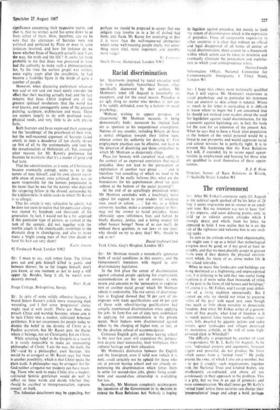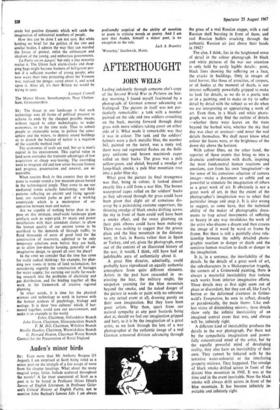The environment
Sir: After Mr Folkes's courteous reply (11 August) Jo my satirical squib sparked off by his letter of 28 July it seems ungracious not to answer in an emol- lient tone. But my intention was not to have 'fun' at his expense, and score debating points; only to hold up to ridicule certain attitudes which I strongly detest and which, from his letter, he appeared to hold. I now realise that he is on the side of the righteous and welcome him to our swel- ling ranks.
To turn to the attitude which I find objectionable, one might sum it up as a belief that technological progress must be good, or if not good at least in- evitable, and that we must placidly accept its grosser fruits even if they destroy the physical environ- ment which, for many of us, alone makes life in this island tolerable.
When so many fine landscapes and buildings are being destroyed at a frightening and unprecedented rate, it is irritating to be told that 'one useful living tradition is of more value than thousands of relics of the past in the form of old houses and buildings.* Of course it is, Mr Folkes, and I accept your defini- 143n of a living tradition unreservedly. But I Lannot see why we should not strive to preserve 'relics of the past' with equal zest, even though they teach us little about morality or democratic freedom. And when Mr Folkes writes of a govern- ment of free people, what kind of freedom is it to watch natural lakes turned into soulless reser- voirs, hills dwarfed by gigantic pylons and radio towers, quiet landscapes and villages destroyed by monstrous airfields, at the will of some high- powered clerk in Whitehall?
The difficulty is pinpointed by another of your L orrespondents, Mr K. L. Kelly (II August). As he says, 'individual protests and arguments, however urgent and powerful, do not produce the force which comes from a "united front."' He justly praises the CPRE, of which I also am a member, but — to put it crudely—such organisations, together with. the National Trust and kindred bodies, are insufficiently co-ordinated, and above all too gentlemanly in their approach to the problem. This is a pity, but we live in an age of gimmicks and mass communication. We shall never get Mr Kelly's 'united front' unless these societies can change their 'pressivationist' image and adopt a bold, perhaps
crude but positive dynamic which will cat& the imagination of substantial numbers of people.
How this can be done I am not sure. But while holding no brief for the politics of the crib and similar bodies, I admire the way they can marshal the forces of protest, enlist the enthusiasm and idealism of the young, and embarrass governments.
'La Pattie en t en danger: but only a tiny minority realise it. The Union Jack alarm-clocks and shop- ping bags might become banners of belligerent pro- test if a sufficient number of young people, _yrho now waste their time protesting-about the Vietnam war, realised the danger, cared about it, and acted upon it. After all, it's their Britain we would be trying to save.
Leonard Cottrell The Manor House, Sevenhampton, Near Chelten- ham, Gloucestershire































 Previous page
Previous page